Genesis Day One
Thursday, August 22, 2024
Submitted by: Juliana Whisman
What an honor to be starting the Genesis Seminar of the KARL Program with Class XVII!
The pace and the tone of the Seminar started right from the beginning on Thursday, with warm welcomes, high energy and excitement, and deep-dives into meaningful topics.
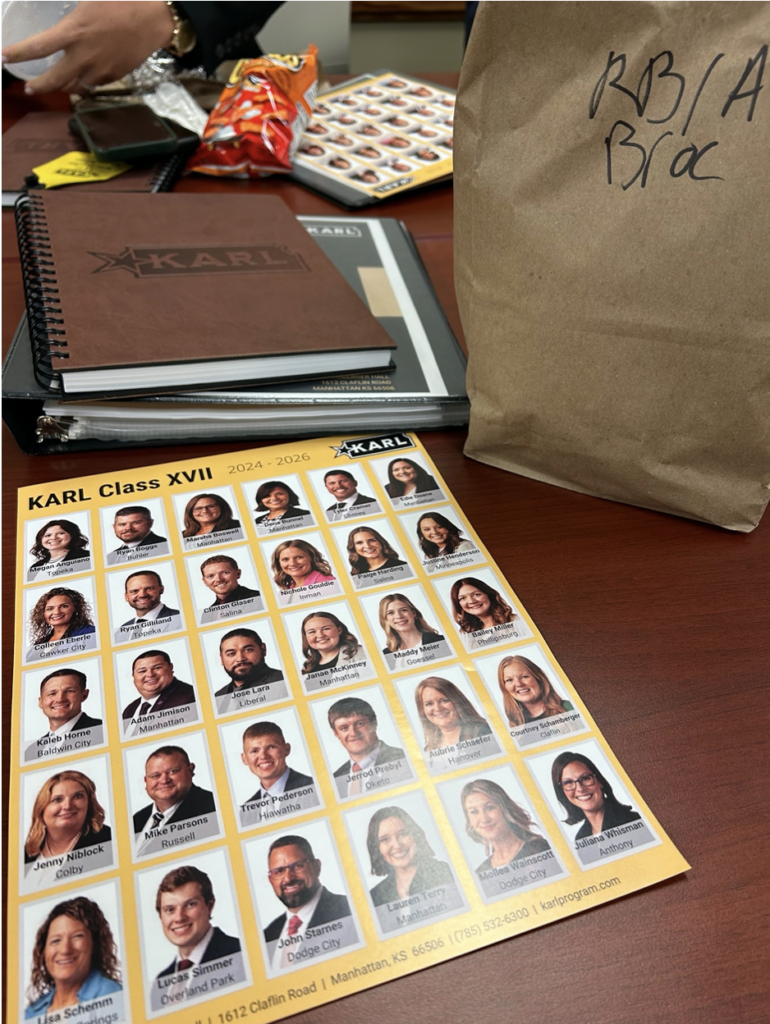
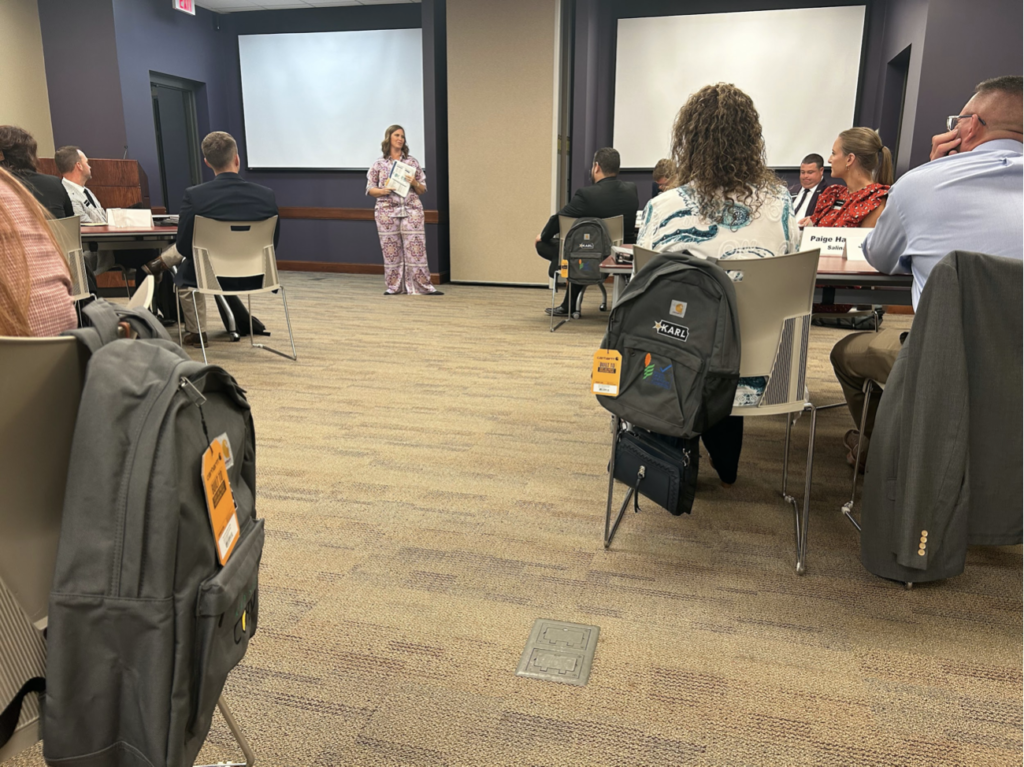
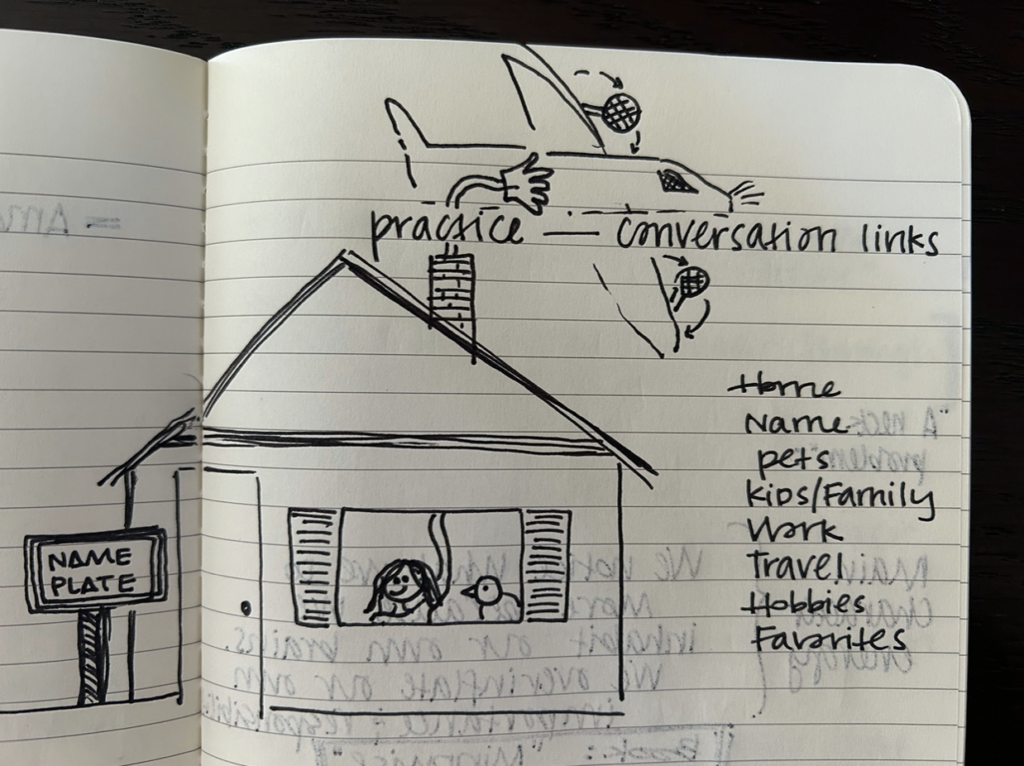
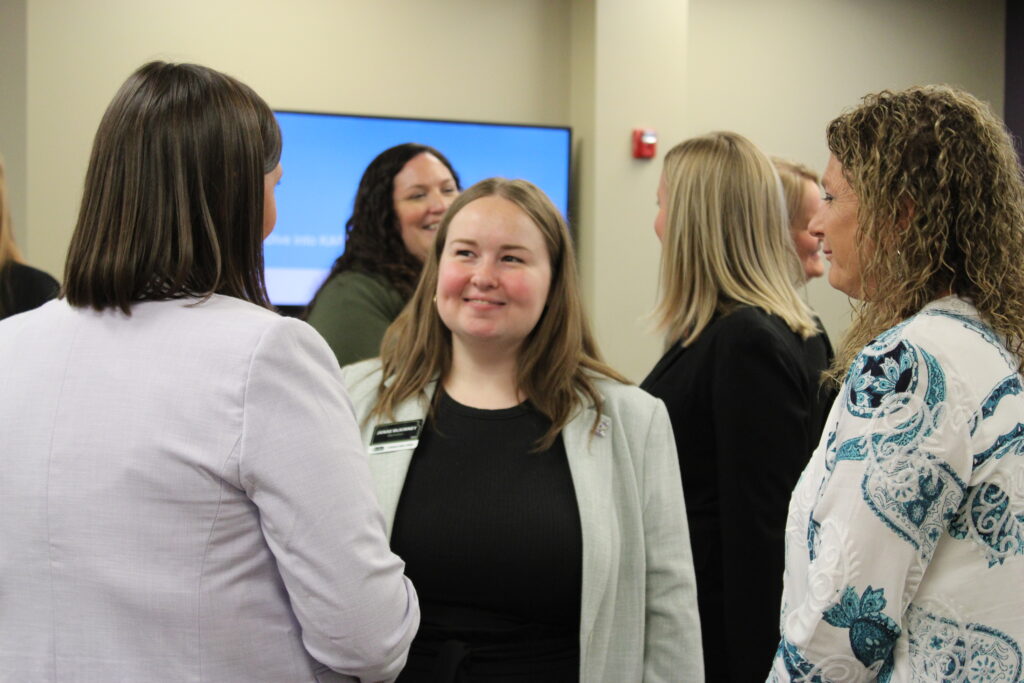
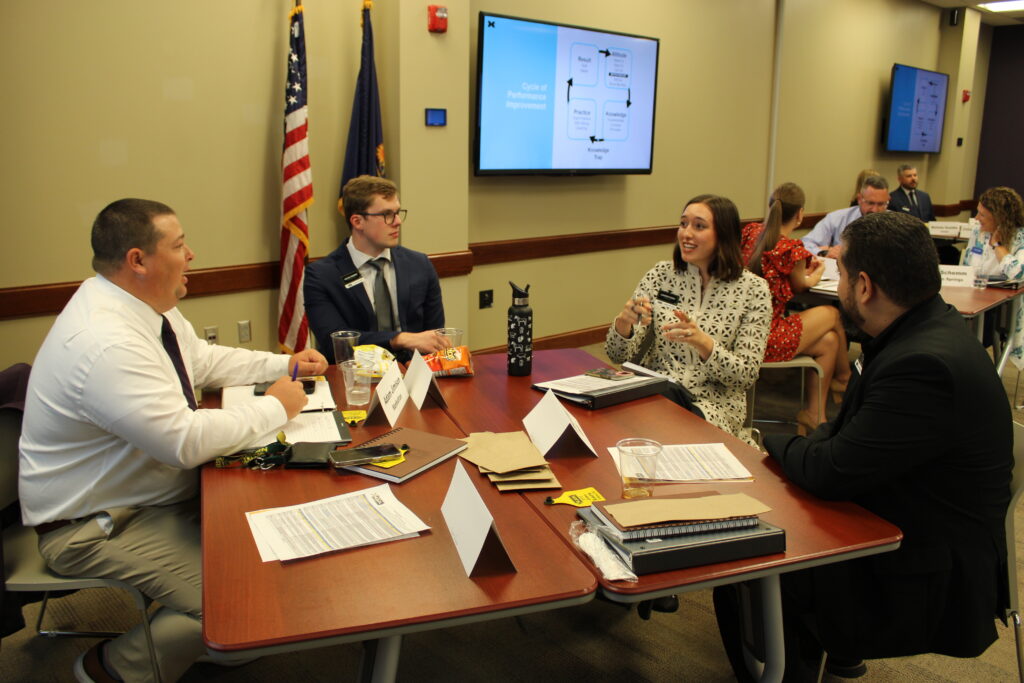
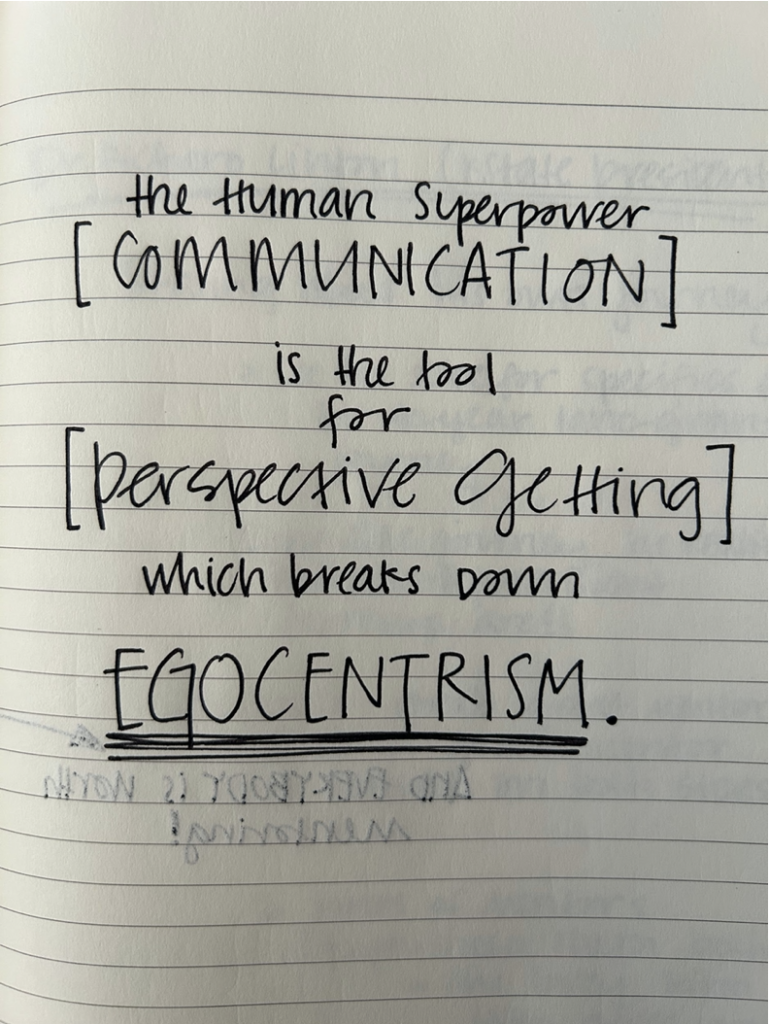




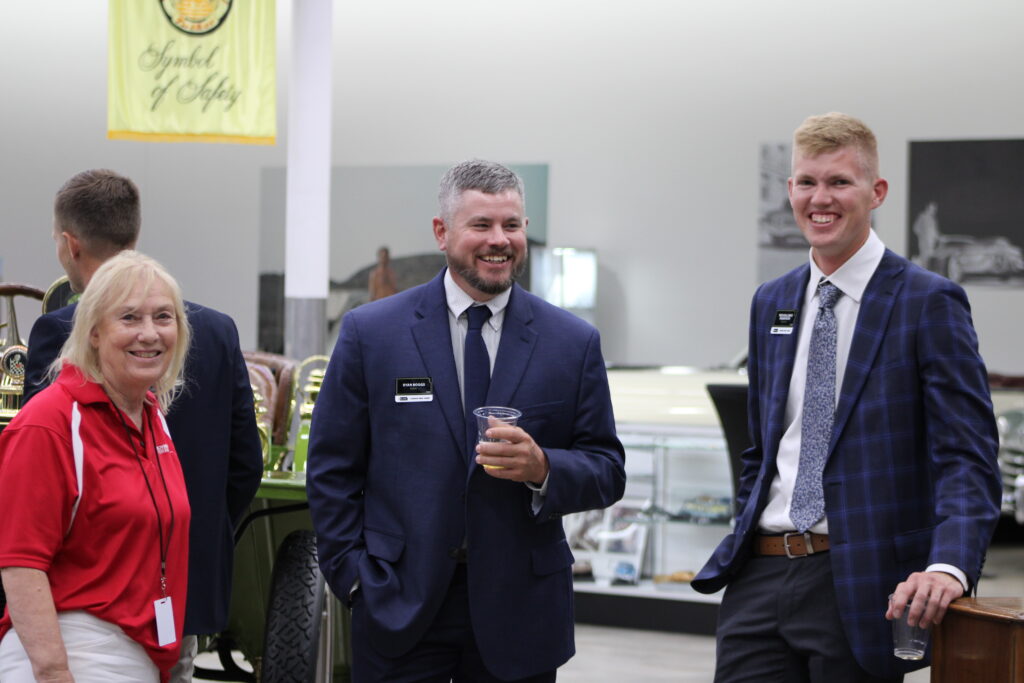
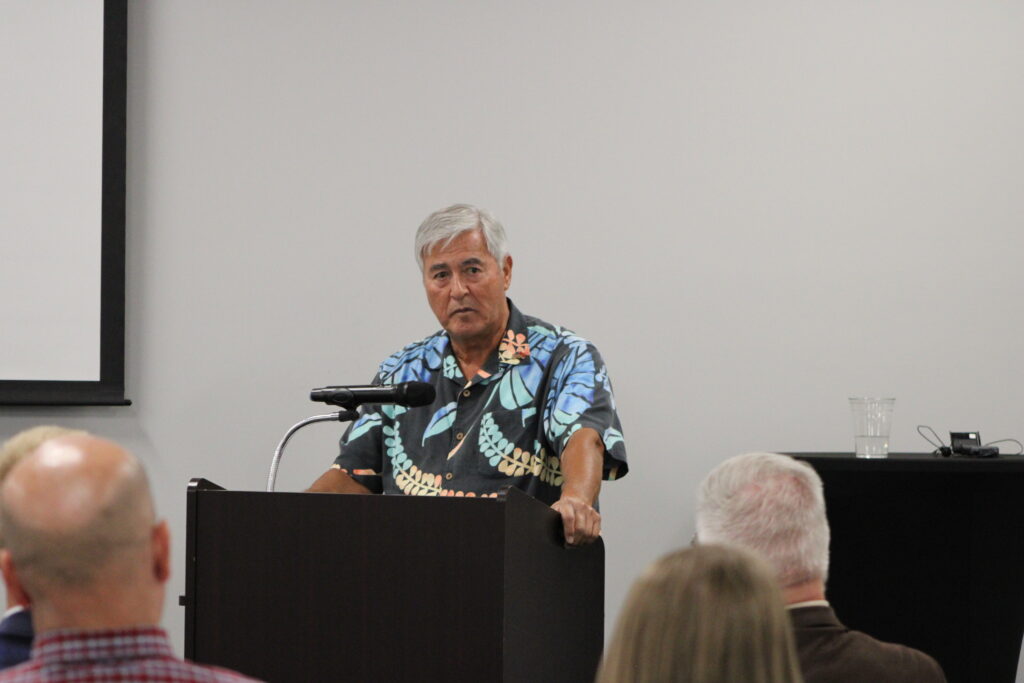

Genesis Day Two
Friday, August 23, 2024
Submitted by: Paige Harding
KARL Seminar: Friday, August 23
Breakfast and Brown Bag Biographies
The day began with a warm breakfast, setting the stage for the first round of “Brown Bag Biographies.”
This activity was designed to be a fun icebreaker. Each participant shared personal stories through meaningful objects that represent aspects of their lives.
Each participant brought three items, which served as prompts for discussing their backgrounds, interests, and values. This exercise not only fostered a sense of community but also provided insight into the diverse experiences and perspectives within the group. People brought wedding rings and hair ties to represent their families; business pens and toy tractors or cattle to represent producers; and there was a lot of KSU gear! This was a fun way to get to know each other better.
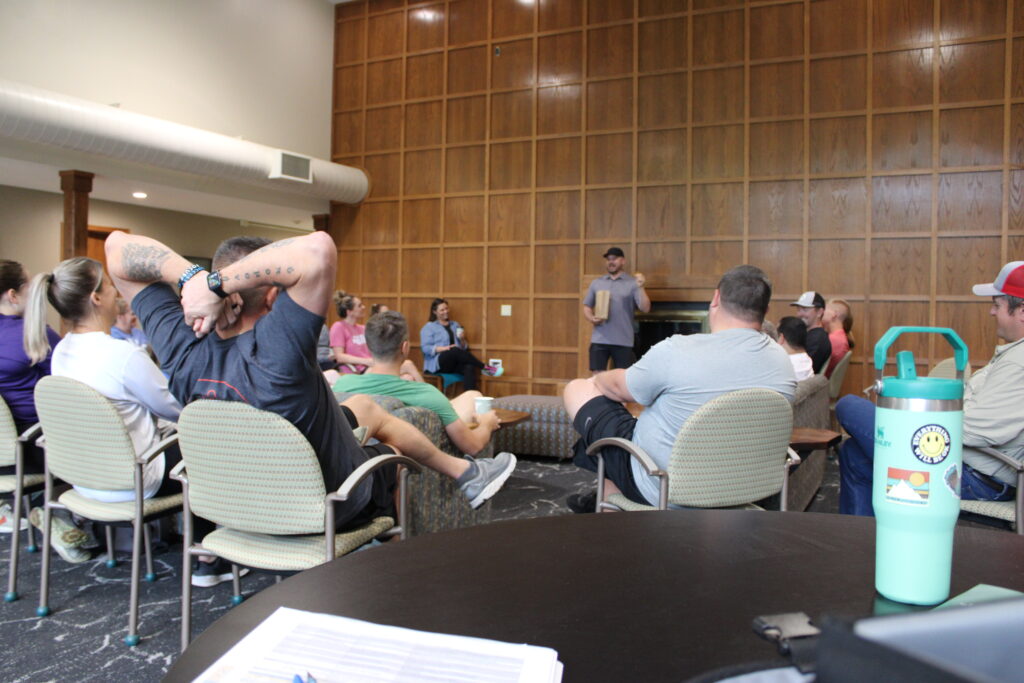
Team Building and Communication Skills
Following the Brown Bag Biographies, the group engaged in a team-building session by way of physical activity. The activities were held at the Ropes Course, led by Joseph Dixon of Rock Springs Ranch.
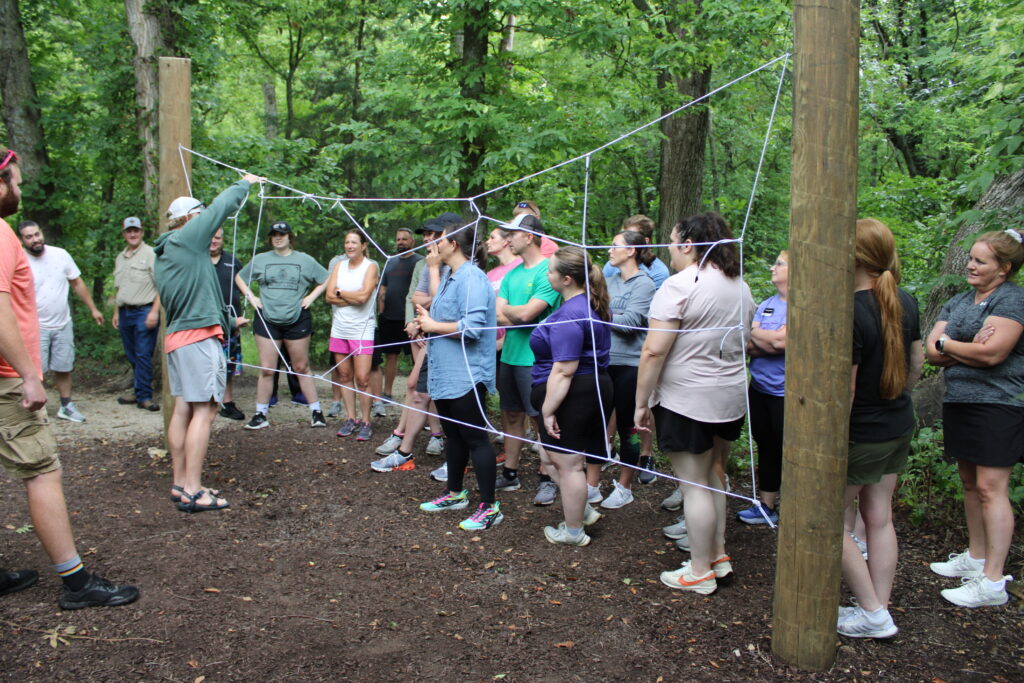
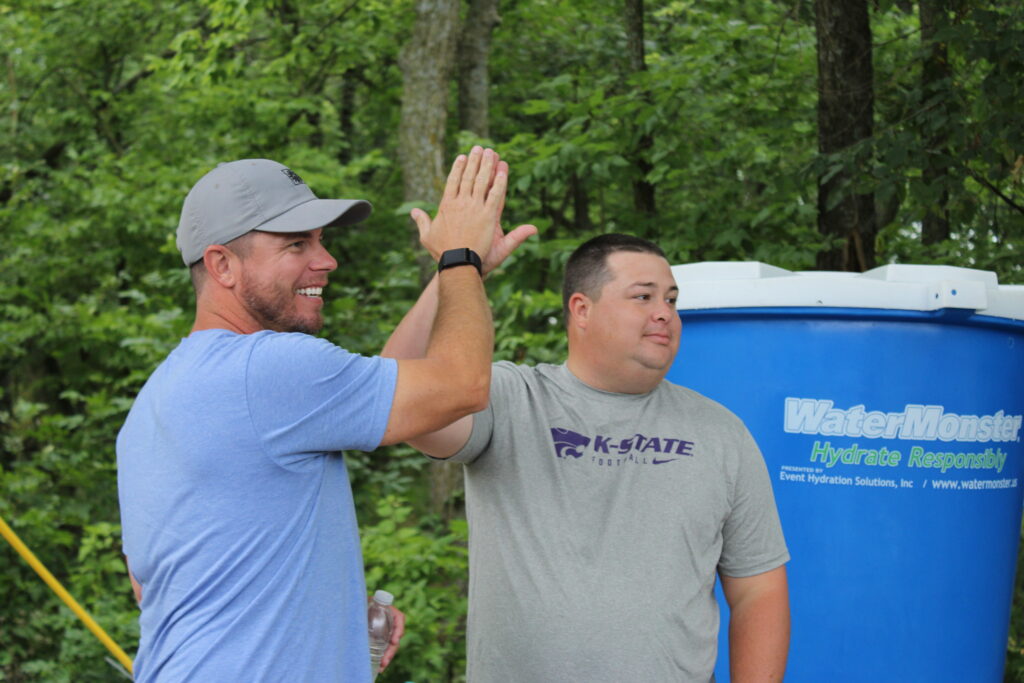
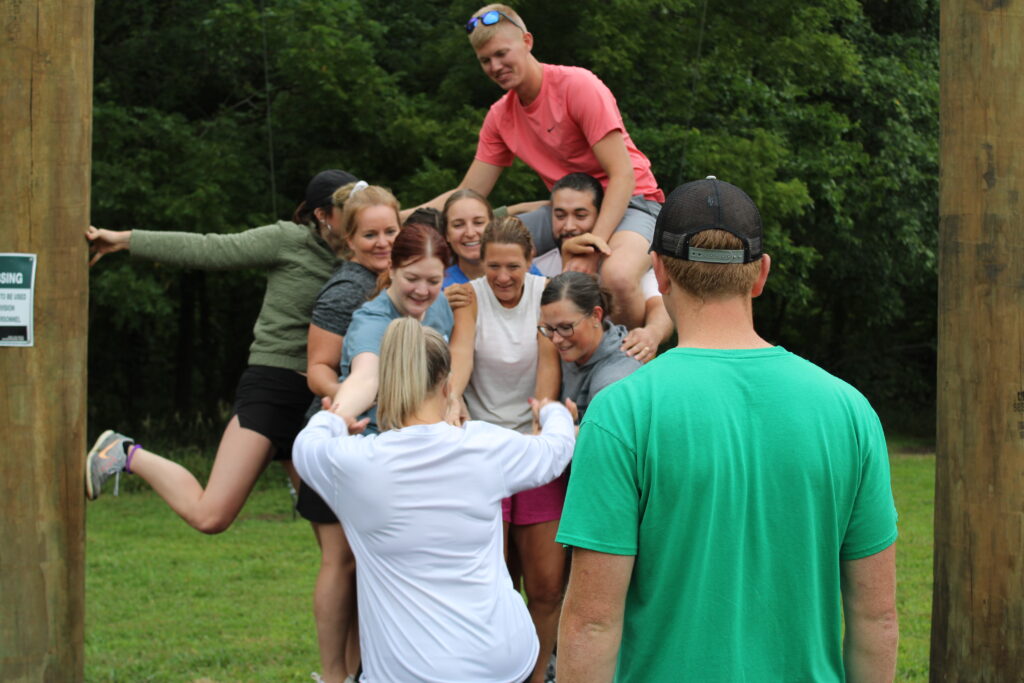
The activities challenged participants to work together, trust one another, and communicate effectively to overcome physical and mental obstacles. These activities were a great way to quickly create relationships among the participants. These relationships will only continue to grow throughout the next 2 years of the program.
Kansas Agriculture: Key Issues Conversation
Kelsey Olson, Deputy Secretary of Agriculture, and Josh McGinn, Assistant Secretary of Agriculture, led a discussion on key issues facing Kansas agriculture. The conversation was heavily about trade and trade policy, a critical aspect of Kansas’s agricultural economy.
Trade is a significant focus for the KDA, with efforts to expand global markets for Kansas products. Agriculture is the #1 economic driver in Kansas. Kelsey and Josh noted Kansas is the #1 exporter of pet food, due to its central location and access to necessary inputs. Meat packing, a vital industry, was also discussed, with more than 50% of the export value of a carcass going overseas. Strong trade relationships, particularly with Japan, were emphasized as crucial for the state’s economic health. Looking forward, Africa is seen as a promising area for new trade relationships, especially Kenya as it is projected to be home to over half the world’s population by 2050. Much of the conversation was centered around transportation costs and issues and how we can overcome these to continue being a large exporter.
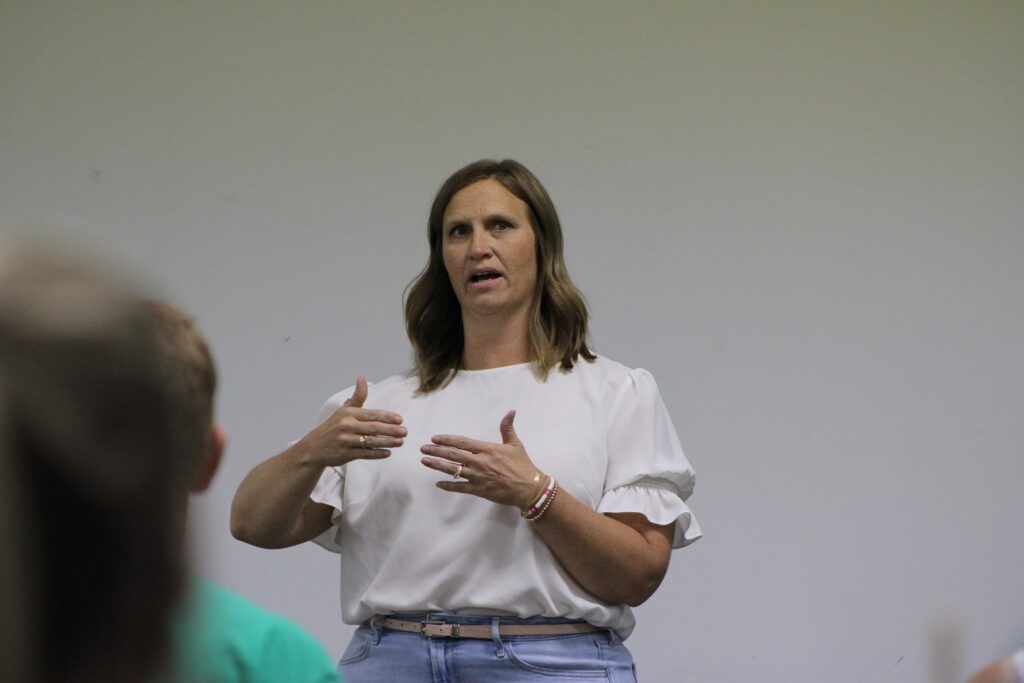
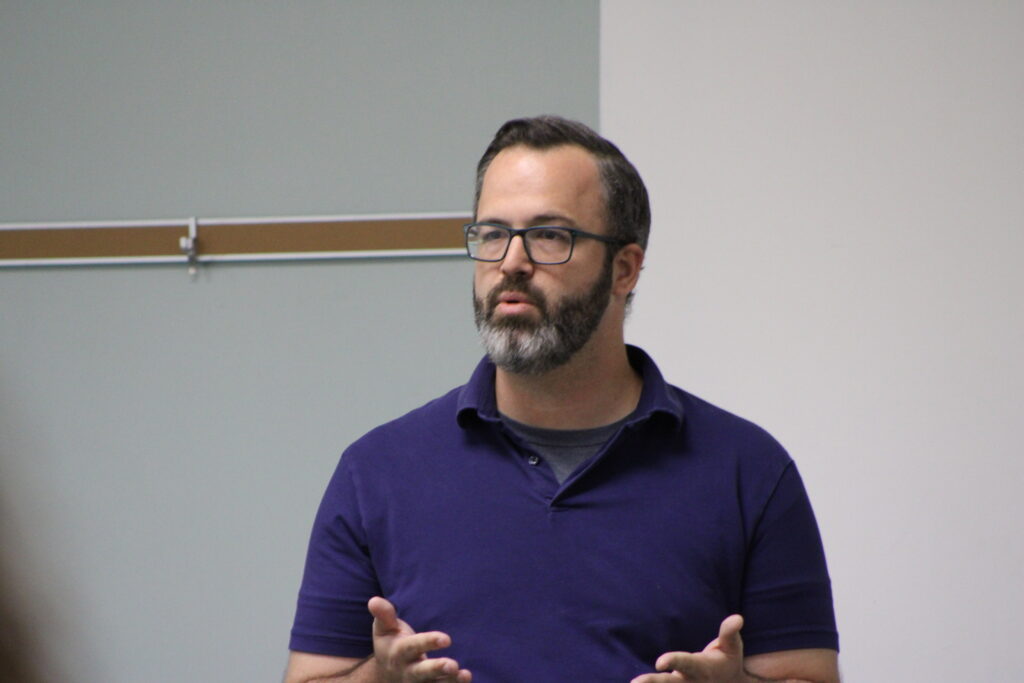
The conversation continued to dive deeper into the critical issues affecting Kansas agriculture, especially in the context of international trade. Josh, drawing from his background growing up on a family farm, illustrated the direct impact of global trade policies on local Kansas farmers and producers. He emphasized that Kansas’ central geographic location, combined with its robust agricultural output, makes it a key player in the global market. However, this also means that fluctuations in trade policies can have a profound effect on the state’s agricultural economy. Kelsey Olson and Josh McGinn emphasized the importance of state and federal policies that support the growth and sustainability of the agricultural sector. They discussed the need for policies that balance the interests of producers with environmental concerns and the need for sustainable practices.
We wrapped up the conversation by discussing the water crisis that plagues Kansas, but especially the western half of the state. Water rights and usage were also discussed, given their critical importance to Kansas agriculture. The state faces ongoing challenges related to water availability and management, particularly in the context of the Ogallala Aquifer, which provides water for much of the state’s agricultural production. The conversation touched on the need for policies that ensure the sustainable use of water resources, balancing the needs of agriculture with those of other stakeholders, including municipalities and industrial businesses.
“I have enough friends… why do I have to be social?”
Rep. Ken Rahjes shared valuable insights during his session on the importance of socialization and communication within leadership groups. He emphasized that every individual brings something unique to a leadership group, and everyone has value to contribute to their community. Drawing from his experiences with farmer friends, Rahjes highlighted that while socializing comes naturally to many, effective communication often proves challenging. He pointed out that socializing isn’t just about casual conversation but involves the more profound art of connecting and sharing ideas meaningfully.
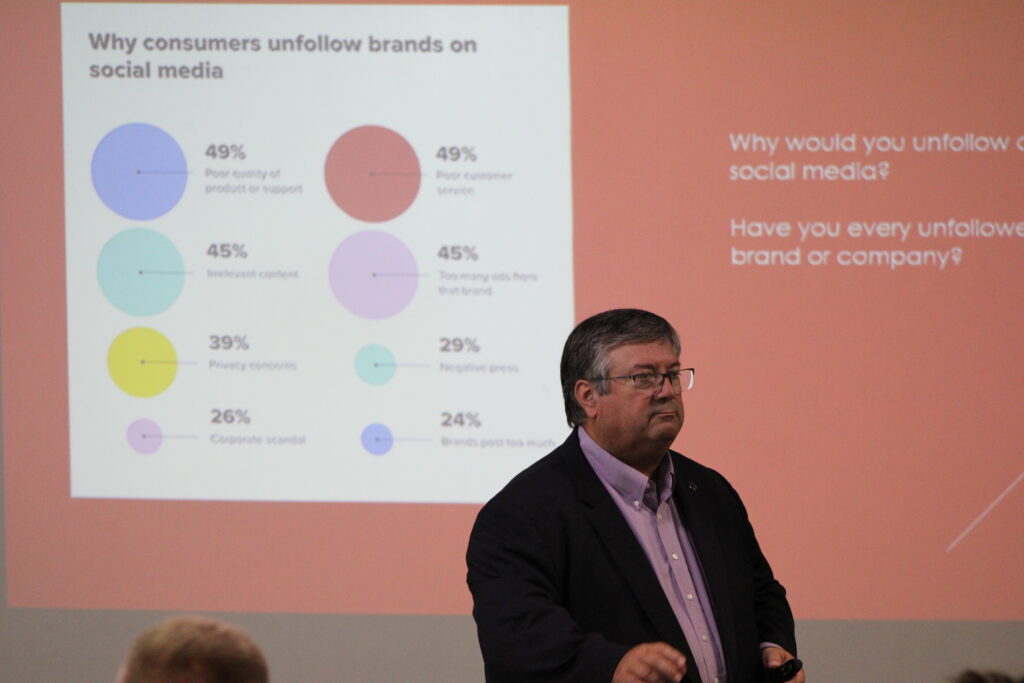
Rahjes then delved into the role of social media as a communication tool in today’s world. He presented findings from a 2023 survey, which revealed that 49% of internet users primarily use social media to stay connected with the people they care about. Additionally, 39% of users turn to social media to fill their spare time, while 34% use it to find news. These statistics underscore the importance of social media in modern communication, especially in maintaining relationships and staying informed.
He continued by sharing data from an April 2024 survey, which ranked the most popular social media platforms. Facebook led the pack, followed by YouTube, Instagram, WhatsApp, and TikTok. Interestingly, social media use is highest in Latin America and the Asia-Pacific region, suggesting regional differences in social media usage habits.
Rep. Rahjes also mentioned that Facebook remains the most popular platform for brands and organizations. The platform’s largest user group comprises men aged 25-34. Moreover, nine in ten Americans aged 18 to 49 use YouTube, highlighting its broad appeal. LinkedIn also plays a crucial role, especially among professionals, with over 700 million users globally. However, only 30% of those who live in rural areas use LinkedIn, compared to 50% of U.S. adults with a college education. These statistics illustrate the varying reach and influence of social media platforms across different demographics.
Overall, Rahjes’ session underscored the importance of recognizing the unique contributions of each individual in a leadership group, as well as the crucial role of effective communication, both in person and through social media, in building strong, connected communities.
Leveraging Your Strengths as a Leader
The focus of Dr. Emily Lehning’s presentation was on helping participants understand and harness their unique talents to become more effective leaders. The session was centered around the Clifton Strengths. Dr. Lehning introduced the concept of talents as innate personality traits—those naturally recurring patterns of thought, feeling, or behavior that can be productively applied in various situations.
She explained that talents might manifest in simple, yet powerful ways, such as the ease with which some individuals start conversations or their ability to think in an organized and timely manner. These talents, when recognized and cultivated, form the foundation for developing strengths.
Dr. Lehning then distinguished between talents and strengths, noting that a strength is characterized by near-perfect performance on a particular task. When someone consistently produces a positive outcome through such performance, it becomes evident that they are operating within their area of strength.
She identified four key components that define a strength: ease, excellence, enjoyment, and engagement.
When individuals work within their strengths, they often experience a natural flow, where tasks feel effortless, outcomes are consistently high-quality, and the process is both enjoyable and deeply engaging.
Moreover, Dr. Lehning emphasized that true strength arises when talent is combined with investment. This investment could be in the form of time, practice, or deliberate effort aimed at refining a talent into a reliable and robust strength. It’s this combination of natural ability and dedicated development that empowers leaders to excel.
Dr. Lehning left us with a deeper question: “How do we accept ourselves and, at the same time, expect more from ourselves?”
Tell Your Story
Jill Zimmerman lead the next session assigning the associates some homework including the famous 6 word memoirs.
Dinner at Kniebel Cattle Company
After a long day of leadership development and in-depth discussions on critical issues facing Kansas agriculture, the associates enjoyed a delicious dinner hosted by Kevin and May Ann (VIII) Kniebel and Joe Carpenter (IX) and Barb Downey.
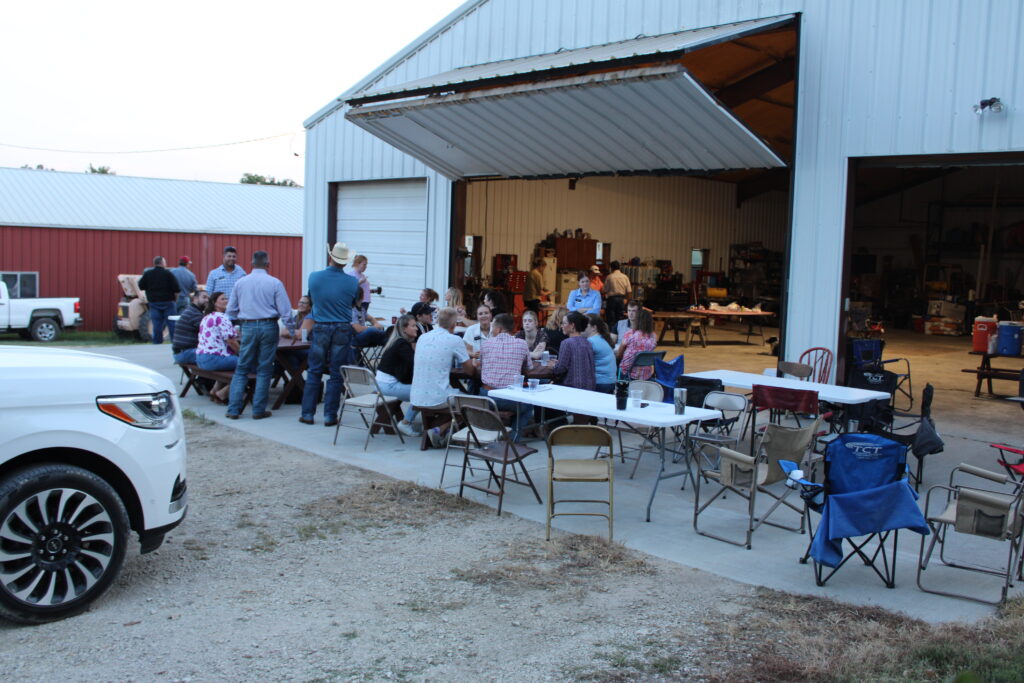
Some highlights of the dinner were the beautiful weather, Mary Ann’s stunning flowers, the almond cake dessert, and great conversations.
Genesis Day Three
Saturday, August 24, 2024
Submitted by: Jenny Niblock
A final look at Genesis:
Day three of KARL Class XII started on a beautiful humid morning at Rock Springs Ranch. The morning began with the reminder of the brown bag biographies with the group sharing three items and explaining their personal context to their lives.
Brown Bag Biographies:
Kaleb Horn: K-State, 1st generation college graduate, built horse, family
Adam Jimison: K-state family, golf, gamble
Mike Parsons: DJ Company, Shriner, ran a bar
Trevor Pederson: Business card, new puppy, keys to travel and fire department
Jenny Niblock: Bible, Family, Stethoscope
Jerrod Prebyl: ear of corn, American flag, binoculars
John Starns: Purina corn, surfer, Family
Lauren Terry: Showboot cattle, cross necklace, ag media business
Mollea Wainscott: best friend necklace, Dodge City Days Pin, Eyesight
Juliana Whisman: Cattle Brand keychain, Legos/Friends, Creative Art
Megan Anguiano: dog, car, craft/reading
Frances and Jill discussed the importance of thanking those who contribute to our journey. The names and addresses of those contributing to the program and day was shared.
Frances spent time encouraging Class XVII to not waste the time and put in the time to participate in KARL. She talked about being open to new ideas and uncomfortable at times. She challenged the class to remain civil. Disagreement is ok through listening to understand, explore conflict, seek common ground, appreciate difference, and respect confidentiality. KARL is a nonpartisan organization. KARL-POOLing continued to be encouraged.
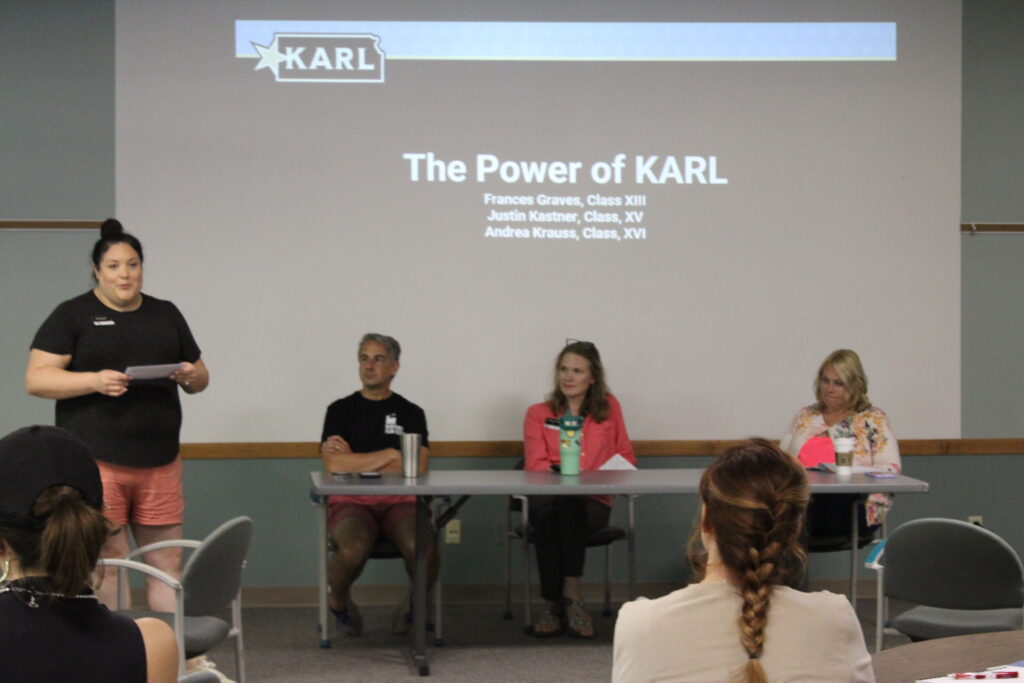
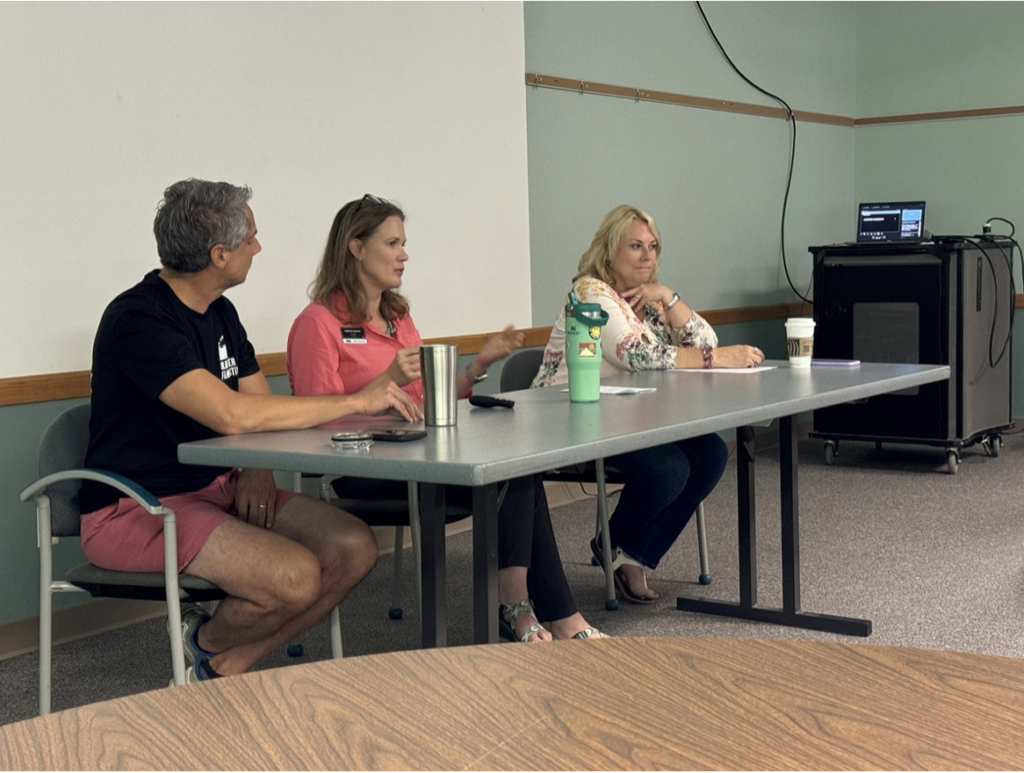
Edie Doane introduced Frances Graves (KARL leadership Program Manager, Class XIII), Justin Kastner (Class XV), and Andrea Krug Krauss (Class XVI) to discuss in panel format “The Power of KARL.”
Justin discussed the programmatic side of KARL including be patient with the process and quality time versus quantity of time. He focused on enjoying the presence of one another by being present through prioritizing seminars. He suggested setting out of office email messages and taking lots of notes. Honor the investment each of us is putting into our time in KARL program. Be intentional in the learning process by using scribe notes, and taking advantage of unscheduled opportunities in the area. Preparing ahead of time is essential to being prepared to fully participate by reading material ahead of time and bringing all item needed to seminars.
Andrea encouraged us to reflect on your class standards at each seminar. She encouraged fully understanding the personality assessment and exercise to better approach conversations with classmates. Andrea discussed filling the class notebook and thank you note follow ups. She encouraged strong engagement in the process, discussions, and debriefings including pre-seminar correspondence, and follow up surveys. Connection with the large KARL network including fellows, classmates, and mentors. Class XVII was reminded us about the investment others put into the KARL program and charged us to steward that wisely.
Recap of Journey to KARL Success:
· Be open
· Be civil
· Be karlpooler
· Be patient
· Be present
· Be intentional
· Be prepared
· Be reflective
· Be engaged
· Be connectors
· Be a good stewards
Frances wrapped up the panel discussion with “KARL Motto”. The KARL class had time to ask questions.
Questions included:
What was the best part of your KARL experience?
Gettysburg leadership, international trip, Garden city
What was surprising take-aways from the KARL program?
Quality of seminars, compassionate situations for fellow classmates, depth of personal commitment
How to best interaction with classmates?
Use laughter, help through hard situations, and be vulnerable and brave
How do you keep the fire and passion for strong leadership going when not surrounding by your KARL classmates and after KARL?
Keep up on the WhatsApp and get together on off time.
How to share your experience with seminars with employers and other?
Use social media, take pictures
Frances Graves transitioned us “Define Your KARL Experience”. Jill shared a video about Mike Krzyzewski and leadership. He encouraged putting people around us in the right position to lead. He discussed empowering others to lead. The most important leadership trait is communication in a face to face manner and always telling the truth. Coach K discussed his experience with the Olympic team and the role of each individual inside the team. Rules don’t lead, but standards are the way we do things all the time. He encouraged good communication to develop trust and to promote success. Example of standards included
· No excuses
· Be on Time
· Practice well
· Have each other’s back
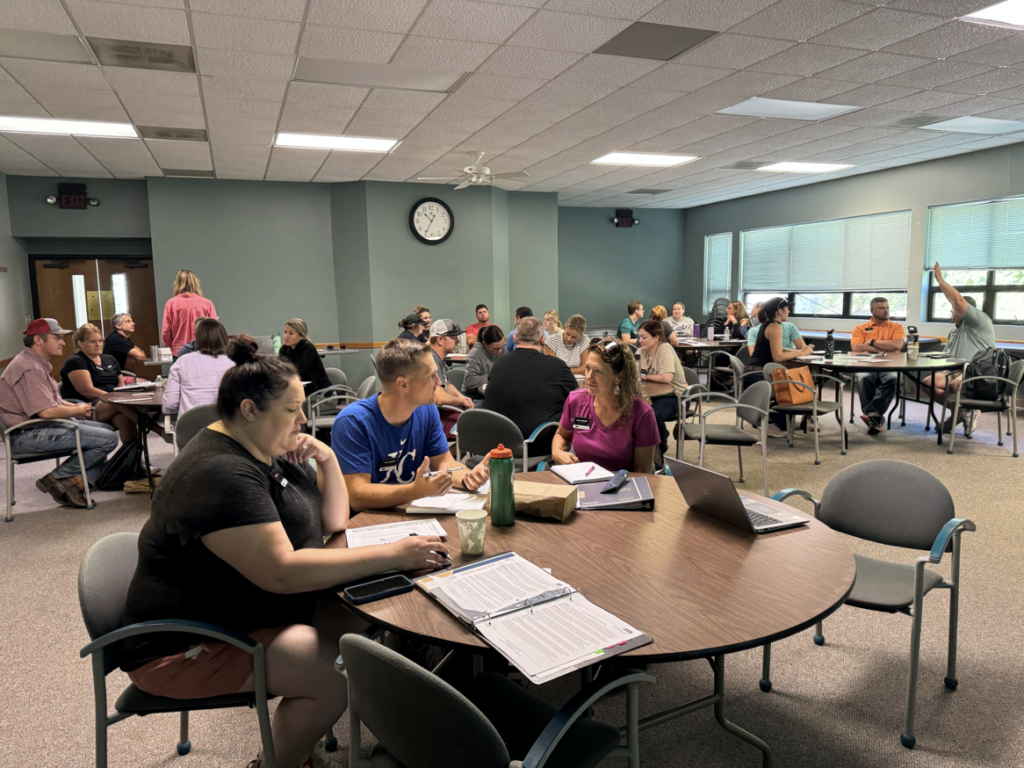
Group Discussions were held to discuss Coach K’s video and brainstorm some ideas to develop standards for our class. Some thoughts shared by the groups:
Two KARL Class XVII and going to work on developing a set of class standards before the next seminar.
Edie Doane provided a time for wrap up with the class the questions and top answers included:
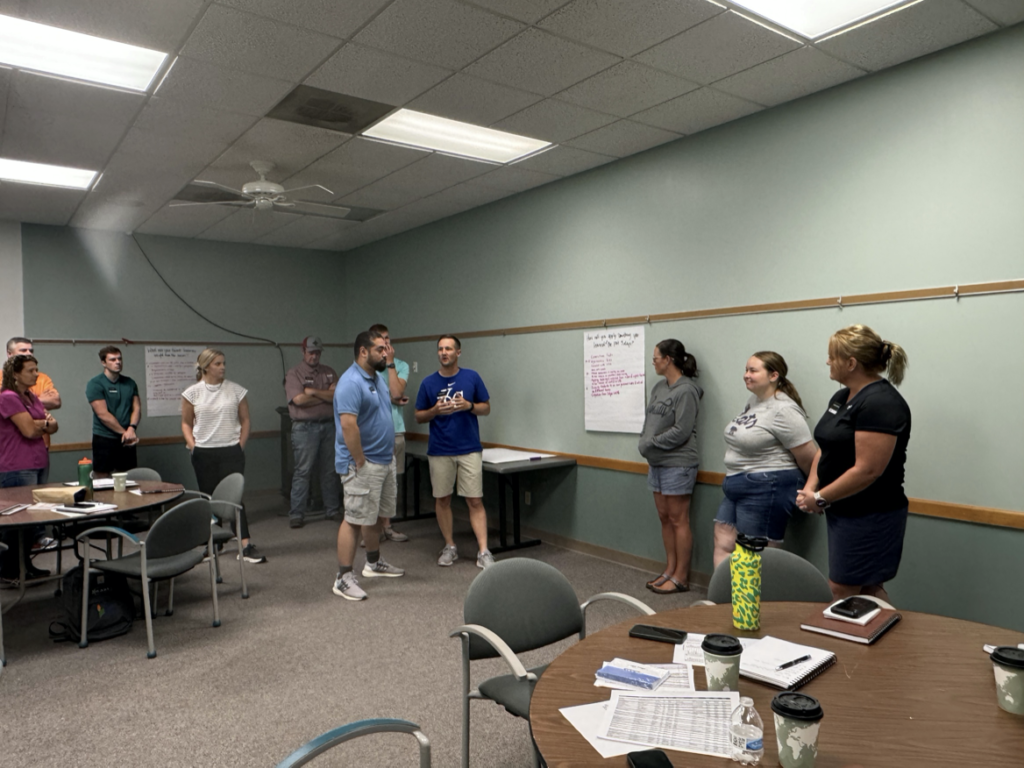
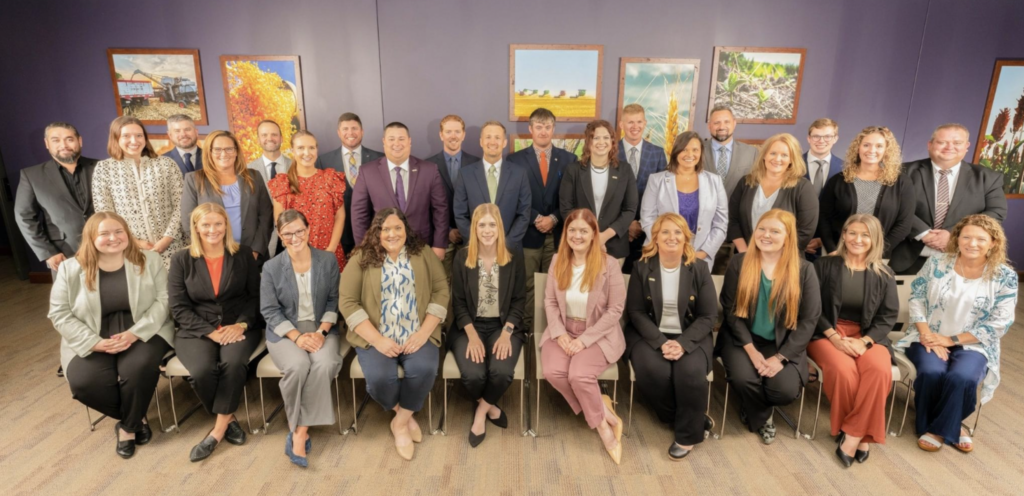
The next seminar will take Class XVII to Southwest Kansas in November.